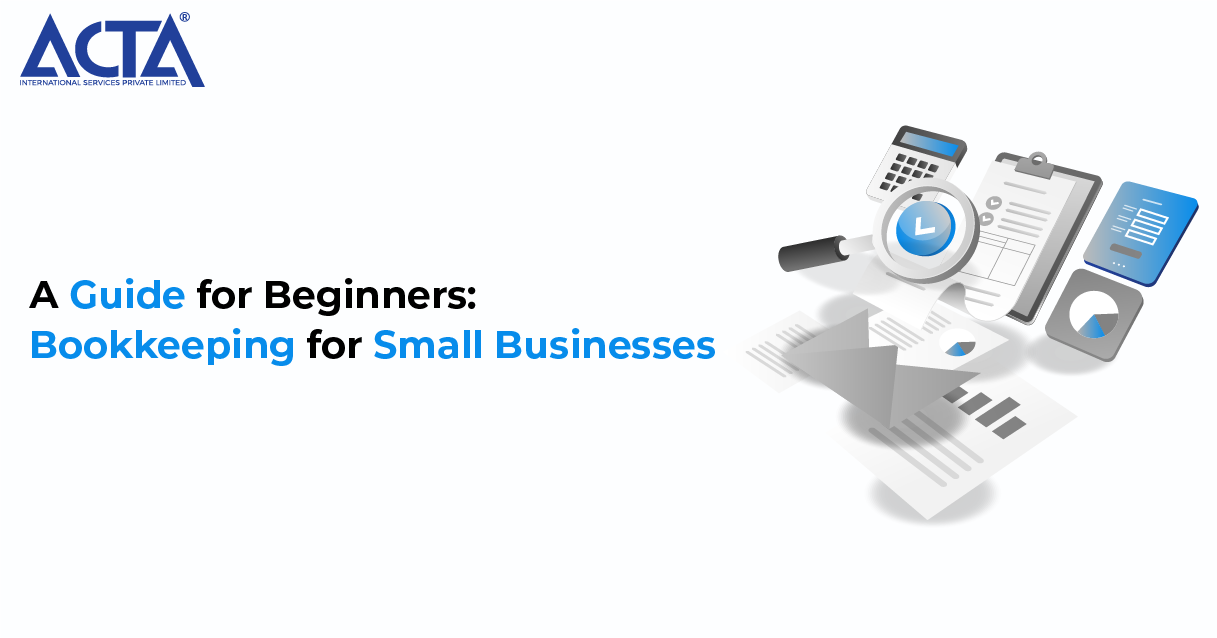
Bookkeeping for Small Business
Apr 11, 2023
By KARTHICK SUBRAMANIAM
What is bookkeeping?
Bookkeeping is the process of recording, organizing, and managing financial transactions of a business. It involves tracking and recording all financial transactions, such as sales, purchases, receipts, and payments, in a systematic and accurate manner. Bookkeeping helps businesses keep track of their financial performance and provides valuable insights into their financial health. It is an essential aspect of accounting and helps businesses comply with tax laws and regulations.
Why Do Small Businesses Need Bookkeeping?
- Financial Management: Bookkeeping helps small businesses to manage their finances effectively by keeping track of their income, expenses, and cash flow.
- Tax Compliance: Small businesses need to comply with tax laws and regulations. Proper bookkeeping ensures that businesses have accurate financial records, making it easier to file taxes and avoid penalties for non-compliance.
- Business Analysis: Bookkeeping provides valuable insights into a business's financial health, allowing small businesses to analyze their performance, identify trends, and make informed decisions.
- Investor and Lender Confidence: Accurate and up-to-date financial records are essential to gain the confidence of investors and lenders, who often require financial reports before making investment or lending decisions.
- Legal Compliance: Bookkeeping helps small businesses to comply with legal requirements such as financial reporting, audit, and record-keeping obligations.
How to Start Bookkeeping in a Small Business?
Starting bookkeeping in a small business involves the following steps:
- Choose a Bookkeeping Method: The first step in starting bookkeeping is to choose a method that works best for the business. Some common bookkeeping methods include the single-entry system, double-entry system, and computerized bookkeeping using accounting software.
- Set up a Chart of Accounts: A chart of accounts is a list of all accounts used to record financial transactions. It helps to organize financial data and makes it easier to prepare financial reports. Setting up a chart of accounts is an important step in bookkeeping.
- Record Financial Transactions: After setting up the chart of accounts, the next step is to record financial transactions. This involves keeping track of all income and expenses, including invoices, receipts, and payments. It is important to ensure that all financial transactions are recorded accurately and in a timely manner.
- Reconcile Bank Statements: Reconciling bank statements involves comparing the business's records with bank records to ensure that all transactions are accounted for and that there are no discrepancies.
- Prepare Financial Reports: Financial reports such as the balance sheet, income statement, and cash flow statement are essential for small businesses. These reports provide valuable insights into the financial health of the business and help in making informed decisions.
- Review and Analyze Financial Data: Regularly reviewing and analyzing financial data is essential for small businesses. This helps to identify trends, areas of improvement, and potential financial risks.
How To Do Bookkeeping For a Small Business?
- Record Financial Transactions: Record all financial transactions, including sales, purchases, payments, receipts, and other financial activities. Use a consistent system to ensure accuracy and completeness.
- Categorize Transactions: Categorize financial transactions according to their nature, such as revenue, expenses, assets, liabilities, and equity. Use a chart of accounts to organize transactions into specific categories.
- Reconcile Bank Statements: Reconcile bank statements regularly to ensure that all transactions are accounted for and there are no discrepancies between bank records and financial records.
- Track Inventory: If your business sells physical products, track inventory to ensure that it is properly recorded in the financial statements. This will help you accurately calculate the cost of goods sold and inventory levels.
- Generate Financial Statements: Generate financial statements such as the balance sheet, income statement, and cash flow statement on a regular basis. This will provide an overview of the financial health of the business and help you make informed decisions.
- Perform Periodic Reviews: Regularly review financial statements and analyze financial data to identify trends, patterns, and potential areas of improvement. This will help you make adjustments to your business operations and improve your financial performance.
- Stay Organized: Keep all financial records organized and maintain backups of financial data to ensure that it is protected in case of loss or damage.
Tips for Small Business Bookkeeping:
- Keep Personal and Business Finances Separate: It is important to keep personal and business finances separate to ensure accurate record-keeping and to avoid confusion during tax season.
- Keep Accurate Records: Accurate record-keeping is crucial for small business bookkeeping. Keep all financial records, including receipts, invoices, and bank statements, organized and up-to-date.
- Automate Bookkeeping: Consider using accounting software to automate bookkeeping tasks such as tracking expenses, generating invoices, and reconciling bank statements. This will save time and reduce the risk of errors.
- Reconcile Bank Statements Regularly: Reconciling bank statements regularly will ensure that all transactions are accounted for and that there are no discrepancies between bank records and financial records.
- Use a Chart of Accounts: Use a chart of accounts to organize financial transactions into specific categories such as assets, liabilities, revenue, and expenses. This will make it easier to generate financial statements and analyze financial data.
- Hire a Professional: Consider hiring a professional bookkeeper or accountant to help manage your finances. A professional can provide valuable insights and advice to help you make informed financial decisions.
- Stay Up-to-Date with Tax Laws: Stay up-to-date with tax laws and regulations to ensure that your business is compliant. This will help you avoid penalties and other legal issues.
Budgeting for bookkeeping services involves the following steps:
- Determine Your Business Needs: Determine the level of bookkeeping services required for your business. This will depend on the size and complexity of your business. For example, a small business may only require basic bookkeeping services, while a larger business may require more extensive services.
- Research Bookkeeping Service Providers: Research bookkeeping service providers and compare their services and pricing. Look for providers with experience in your industry and positive reviews from other businesses.
- Obtain Quotes: Contact bookkeeping service providers and obtain quotes for their services. Be sure to provide them with information about your business needs and requirements.
- Evaluate Costs: Evaluate the costs of different bookkeeping service providers and determine which provider offers the best value for your business. Consider factors such as experience, services provided, and pricing.
- Create a Budget: Create a budget for bookkeeping services based on the costs of the selected service provider. Be sure to include any additional costs such as software or equipment.
- Monitor and Adjust: Monitor bookkeeping service costs and adjust your budget as necessary. This will help ensure that your business remains within budget and that bookkeeping services are affordable.
- Offshore Bookkeeping: consider offshore bookkeeping as a budget-friendly option with skilled professionals. Offshore bookkeeping can often provide cost savings compared to local bookkeeping services, while still offering skilled professionals with experience in your industry.
Small Business Bookkeeping Mistakes to Avoid:
- Not Keeping Accurate Records: Accurate record-keeping is crucial for small business bookkeeping. Failing to keep accurate records can lead to financial mismanagement, missed tax deductions, and even legal issues.
- Mixing Personal and Business Finances: Mixing personal and business finances can lead to confusion and inaccurate record-keeping. This can also make it difficult to track expenses and file taxes accurately.
- Not Reconciling Bank Statements: Failing to reconcile bank statements regularly can lead to errors and discrepancies in financial records. This can make it difficult to track expenses and revenue accurately.
- Failing to Track Expenses: Failing to track expenses can make it difficult to manage cash flow and plan for the future. This can also lead to missed tax deductions and inaccurate financial reporting.
- Not Using a Chart of Accounts: Failing to use a chart of accounts can make it difficult to organize financial transactions and generate accurate financial statements. This can also make it difficult to analyze financial data and make informed business decisions.
- Misclassifying Transactions: Misclassifying transactions can lead to inaccurate financial reporting and tax issues. It is important to ensure that all transactions are classified correctly and accurately.
- Ignoring Tax Laws and Regulations: Failing to comply with tax laws and regulations can lead to penalties and legal issues. It is important to stay up-to-date with tax laws and regulations and ensure that your business is compliant.
FAQs
Bookkeeping involves the day-to-day recording of financial transactions, while accounting involves the interpretation, analysis, and presentation of financial data. Bookkeeping is the foundation for accounting and provides the data necessary for financial analysis and reporting.
There are many bookkeeping software options available for small businesses, including QuickBooks, Xero, and FreshBooks. The best software for your business will depend on your specific needs and budget.
It is recommended that you reconcile your bank statements monthly. This helps ensure that your financial records are accurate and up-to-date.
A chart of accounts is a list of all the accounts used in a business’s bookkeeping system. It helps organize financial transactions and provides a structure for generating financial statements.
This will depend on the size and complexity of your business. If you have a small business with relatively simple financial transactions, you may be able to handle bookkeeping tasks on your own. However, as your business grows, it may become more beneficial to hire a professional bookkeeper to manage your financial records.
Offshore bookkeeping can be a cost-effective option for small businesses. By outsourcing bookkeeping tasks to a service provider located in another country, small businesses may be able to access skilled professionals at a lower cost than hiring a local bookkeeper. Additionally, offshore bookkeeping service providers may offer flexible pricing options, such as hourly rates or fixed fees, which can help small businesses budget for bookkeeping services. However, it is important to carefully evaluate offshore bookkeeping service providers and ensure that they meet your business needs and requirements, as well as comply with applicable laws and regulations.













